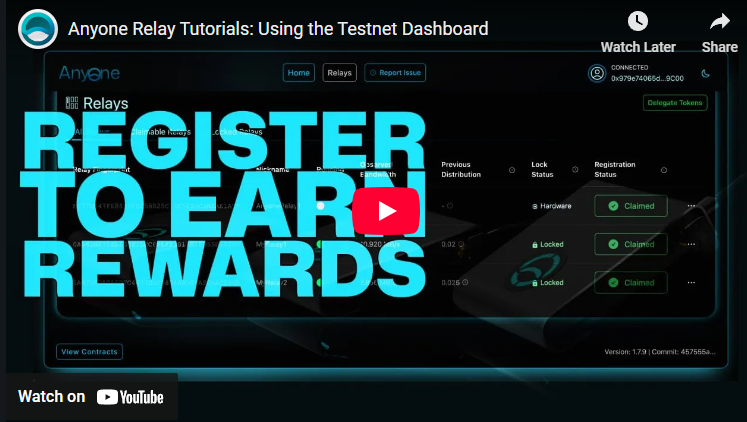Status & Term History
Current Distribution Rate
Currently, rewards are distributed at a total rate of 2500 tokens a day. This is split as follows:
80% to all relays (within which 30% of rewards are given purely based on uptime)
20% exclusively to verified hardware relays
With the exception of rewards for uptime, rewards in each pool are distributed based on a relay's consensus weight, which rises with higher bandwidth and also over time. Over the Incentivized Testnet period, the total distribution rate will rise up, with existing reward values expanded and new reward categories added.
Snapshotting
Airdrop System
Currently, relay operators claim Sepolia testnet tokens for participating. They are then airdropped mainnet tokens weekly in accordance to the qualifying tokens claimed. See this Medium article for more information.
The dashboard rewards will not reset in between each airdrop, or prior to the Incentivized Testnet going live. Instead, snapshots will be taken prior to the beginning of the testnet going live, and after each airdrop period. This snapshot information will be publicly accessible, allowing users to infer the number of tokens they are eligible for in the next airdrop.
The snapshots will initially be posted to GitHub, and will later be part of our Rest API.
Reward Prerequisites
Critically, every wallet must hold 100 mainnet $ANYONE tokens for every relay registered (excluding hardware relays), prior to each airdrop to be eligible. A wallet that does not meet this prerequisite will see the message "mainnet balance too low" on the dashboard. Rewards earned by relays that do not fund their wallet before the airdrop may be forfeited. This prerequisite does not apply to the Anyone hardware relays.
Upcoming
A non-exhaustive list of proposed and planned features to be added to the rewards system
Percentage bonus for declared families
Mainnet $ANYONE lock requirement
Multipliers and dividers based on geolocation, encouraging more geographically diverse relays
Rewards for relays with an Exit and Entry flag
The relay reward protocol is also currently being migrated to AO in accordance to the new direction taken by Arweave. This will improve dashboard performance and decentralize the protocol further.
Last updated
